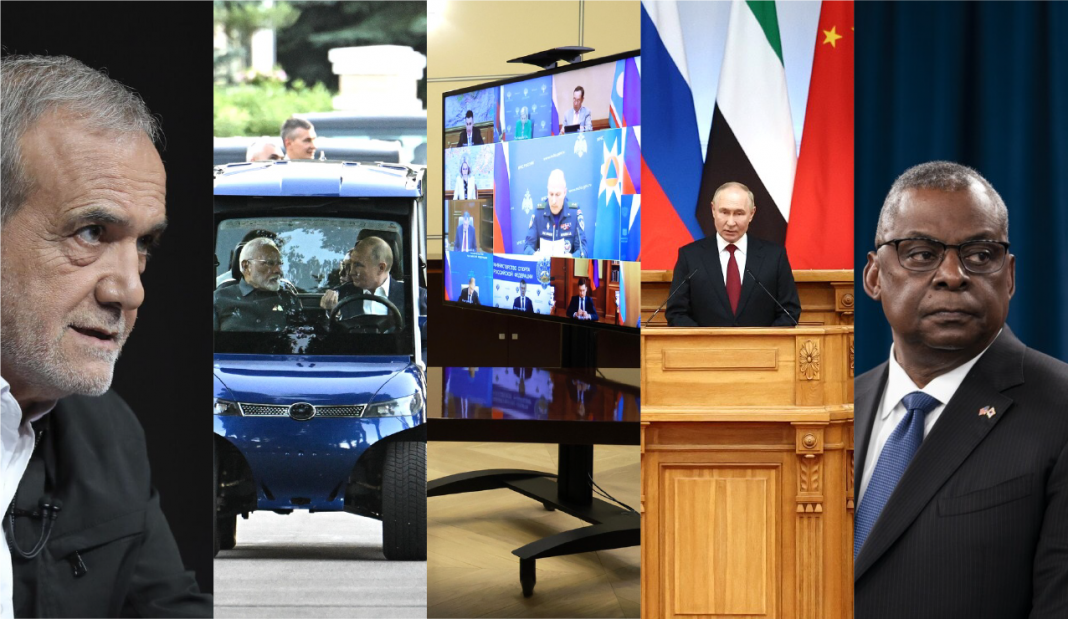This report presents key events that had an important impact on political, economic and social processes inside Russia.
The following trends can be summarised from the results of the past week:
- The telephone conversation between Peshkesian and Putin showed that there should be no fears for Russia (at least at the current stage). The parties assured each other of their loyalty to the former political course and the former interests of the states. The first public political statements of the Peshkesian are also fully in the spirit of the need to honour the previous agreements. Thus, it can be stated that no radical change in Russian-Iranian relations should be expected in the near future.
- According to Ascolta, the meeting with the permanent members of the Security Council focused exclusively on schedules for the release of military equipment, the launch of new weapons systems and the introduction of new developments. Putin demands that Chemezov and Manutrov show a very high rate of armament comparable to that of the United States. He needs impressive figures as an argument for new negotiations with the West. Also, according to our information, Putin was not entirely satisfied with the figures that were voiced by Manturov.
- In fact, the second conversation between Andrei Belousov and Lloyd Austin over the past month shows that the permanent line of communication between the US and Russian defence departments is working again. The fact that immediately after the conversation it was announced that tensions on the Ukrainian-Belarusian border would be de-escalated is also indicative – neither Lukashenko nor Zelensky would have made such a decision on their own. On the whole, it can be assumed that the parties have taken the first steps towards lowering the degree of relations between the two countries. But the real warming of relations is still a long way off.
This digest looks at the following issues that were most relevant to Russia between the 8th and 14th of July:
1. Telephone conversation between Vladimir Putin and Iranian President-elect Massoud Pezeshkian;
2. Indian Prime Minister Narendra Modi’s visit to Moscow;
3. Meeting with members of the Government;
4. Vladimir Putin’s speech at the 10th BRICS Parliamentary Forum;
5. Meeting with permanent members of the Security Council;
6. Andrei Belousov’s telephone conversation with Lloyd Austin.
This Content Is Only For Subscribers
1. Telephone conversation between Vladimir Putin and Iranian President-elect Massoud Pezeshkian
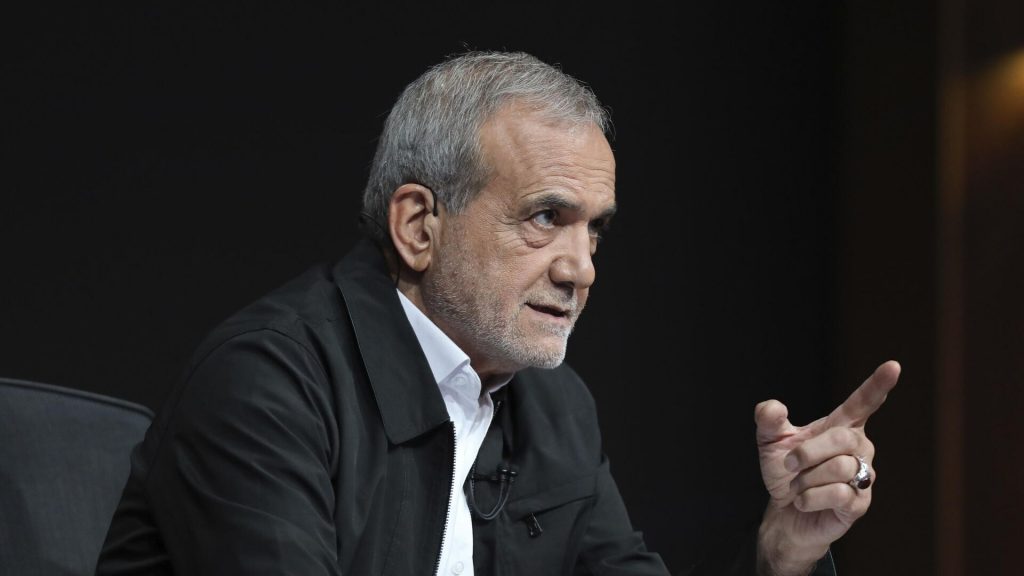
On Monday, 8 July, Vladimir Putin had a telephone conversation with the newly elected President of the Islamic Republic of Iran, Massoud Pezeshkian. According to official reports from both sides, the main topic of the conversation was the congratulation of Masoud Pezeshkian from the Russian president on his election victory. It is also noted that both presidents expressed satisfaction with the high level of good neighbourly Russian-Iranian relations achieved and reaffirmed their readiness to work closely together to further develop cooperation in various fields.
Following the conversation, Putin and Pezeshkian agreed to hold a personal meeting in the coming months. According to preliminary information, the Iranian president’s visit to Moscow is planned for October.
Outcomes/Predictions:
Close relations with Iran are very important for Russia, as well as the predictability of bilateral ties. After the tragic death of President Raisi, many experts predicted the possibility of a cooling of relations between Iran and Russia, as the presidential election saw Peshkezian, a supporter of normalising relations with the West and Turkiyeh, a representative of the reformist wing of Iranian politics, take the presidency.
The telephone conversation between Peshkezian and Putin showed that there should be no fears for Russia (at least at the current stage). The parties assured each other of their loyalty to the former political course and the former interests of the states. The first public political statements of the Peshkesian are also fully in the spirit of the need to honour the previous agreements. Thus, it can be stated that no radical change in Russian-Iranian relations should be expected in the near future.
2. Visit of Indian Prime Minister Narendra Modi to Moscow
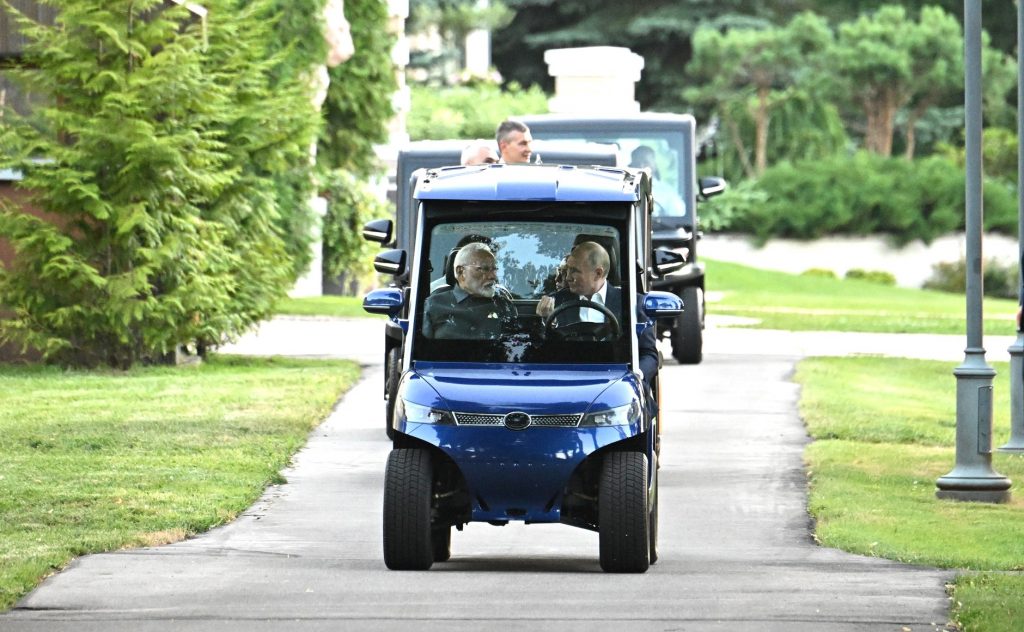
On Monday, 8 July, Indian Prime Minister Narendra Modi arrived in Moscow on a two-day official visit. According to the announced agenda, during the visit the prospects of further development of traditionally friendly Russian-Indian relations, as well as topical issues of international and regional agenda were discussed. It is noted that Modi’s visit to Russia was his first in the last five years. Immediately upon arrival, Narendra Modi headed to Putin’s residence near Moscow in Novo-Ogaryovo, where informal talks between the two leaders took place.
Key talking points from the open part of the informal meeting:
- Putin: “We will have official talks tomorrow, and today we can talk quietly in such a domestic atmosphere, probably about the same issues – but unofficially.”
- Putin: “But at the beginning I would like to congratulate you on your re-election as Prime Minister. I think this is not an accident, but the result of your work for many years at the head of the Indian government. You have your own ideas, you are a very energetic person, able to achieve results in the interests of India and the Indian people. And the result is obvious: India is the third largest economy in the world. It is probably the largest country in the world in terms of population – 1.4 billion people”.
- Putin: “But the most important thing is not that – the most important thing is that 23 million births a year. Even for a country like India, this is still a lot. It is the largest figure in the world. It’s not just numbers, it means that people are planning their families, their lives, the planning horizon is expanding. And that means they feel confident, they feel a certain stability, which is very important.”
- Modi: “It is a great joy to visit a friend’s home. You have invited me to your home. I would like to thank you for creating such an interesting programme and for your warm words. I am very grateful.
- Modi: “India is the largest democracy, it is considered the ‘mother of democracy’ and about 650 million people voted in this election. For the first time in the last 60 years, the government got elected for the third time in a row. The first time [it was done] by the first Prime Minister Jawaharlal Nehru, he got elected for the third time, and after 60 years I have got this opportunity. The people of India have given me this chance – to serve the motherland.”
- Modi: “I have been in government for 10 years and I have a principle: reform, execute and transform. So the people of India voted for this principle and I am confident that I will work three times as hard in my third term.”
Already on Tuesday, 9 July, official talks between Putin and Modi took place at the Grand Kremlin Palace. Foreign Ministers of the two countries, Russian Industry Minister Denis Manturov, Finance Minister Anton Siluanov, Director of the Federal Service for Military-Technical Cooperation Dmitry Shugaev, Chief Executive Officer of Rosneft Igor Sechin, Deputy Head of the Presidential Administration Maxim Oreshkin, and Presidential Aide Yuri Ushakov also took part in the talks from the Russian side.
Key talking points:
- Putin: “Dear Mr Prime Minister, this is your first official visit after your reappointment following your election to parliament. I would like to congratulate you on this once again.”
- Putin: “There is a very long-standing friendship between our countries, good relations that have developed over decades. This year we are celebrating 77 years of diplomatic relations.”
- Putin: “Today our relations have the character of a particularly privileged strategic partnership. We are in constant contact with you and our main focus is on the development of trade and economic ties, the development of which is certainly in the interests of both the people of India and the people of the Russian Federation.”
- Putin: “We had an opportunity yesterday to talk practically on all issues in an informal atmosphere. I am grateful to you for the attention you are paying to the most acute problems, including trying to find some ways to resolve the Ukrainian crisis, and of course, first and foremost through peaceful means.”
- Modi: “Your Excellency, for the last 40-50 years India has tolerated terrorism and suffered from terrorism. How terrible it is, we are experiencing it first hand. Recently there were terrorist attacks in Moscow and then in Dagestan, so I can imagine the pain you feel after these terrorist attacks and that is why we strongly condemn all kinds of terrorism.”
- Modi: “Your Excellency, I have deep ties with Russia and personally with you for the last two and a half decades. You and I have met 17 times in the last 10 years. This is my sixth visit to Russia and we are participating in our 22nd bilateral summit today. All this shows the depth of our relations, our close co-operation. I can say with confidence, based on our past experience, that we will work together in the future, we will strengthen our co-operation and deepen all aspects of our co-operation and we will achieve new goals.”
- Modi: “Your Excellency, the last five years have been very difficult for the whole world, for all the countries of the world. There have been different conflicts, different crises. First COVID created difficulties for the whole world and humanity, then came different conflicts, differences, and that is why humanity was in such a difficult position. At such a time, thanks to India-Russia friendship, when the world was facing different crises in the area of food security, in the area of fuel, in the area of fertilisers, it is because of our friendship with you that we have avoided all the difficulties for Indian farmers and we have met all their fertiliser needs. And this is the special role of our friendship with you and we are fully committed to protect the interests of Indian farmers through our co-operation with you. We will continue to work in this direction and we will only strengthen our co-operation.”
- Modi: “Your Excellency, I want to say that we have been associated with each other for 25 years and we are having our 22nd bilateral summit, but the focus of the world community is my current visit: the whole world is watching this with great interest. The whole world is giving their own meaning to this visit as they think is right. Yesterday we had a wonderful opportunity to spend four or five hours at your residence. We discussed all the issues at home and I am very happy that also on the subject of Ukraine, we exchanged views in an open manner, we respected each other’s opinion and we talked calmly.”
- Modi: “Your Excellency, let us take war, any conflict or terrorist attacks: any person who believes in humanity feels pain when people die and especially when innocent children die. When we feel such pain, our hearts just explode and I had the opportunity to talk about these issues with you yesterday.”
- Modi: “As your friend, I always tell you that for the bright future of our future generations, peace is a must. Therefore, we believe that war is not a solution. There can be no solution through war. Bombs, missiles and rifles cannot bring peace, so our emphasis is on dialogue and dialogue is necessary.”
- Modi: “We also agreed yesterday to bring peace at the earliest and we are ready for any assistance in this endeavour. I have heard your position, your positive views and reflections. And I can assure you that India has always been on the side of peace. As I listened to you, I felt optimistic and there was hope for the future. So I want to thank you for that.
At the end of the official talks, Vladimir Putin presented Narendra Modi with the Order of St Andrew the Apostle. The ceremony took place in the Andreyevsky Hall of the Grand Kremlin Palace. Putin and Modi also visited the Atom exhibition at VDNKh, dedicated to the modern nuclear industry.
Summary/Predictions:
India, as the largest country on the globe by population and an influential political player on a planetary scale, has long been of interest to Russia. In principle, back in the days of the USSR, India was used as a communicator between the two parts of the divided world. Now Russia is taking advantage of the fact that Narendra Modi demonstrates duality of position – he is flirting with both Russia and the West (at the same time trying to resolve the frozen conflict with China). In addition, Modi is a close friend of Emmanuel Macron, as well as the leader of a country that controls a significant part of the Indian Ocean and influences a number of states in the Global South.
From Russia’s point of view, this visit and meeting is a very important diplomatic gesture that shows the futility of US attempts to split the Global South and deprive Russia of support in the world. At least the US will have to strain to find new approaches and proposals for India.
3. Meeting with members of the Government
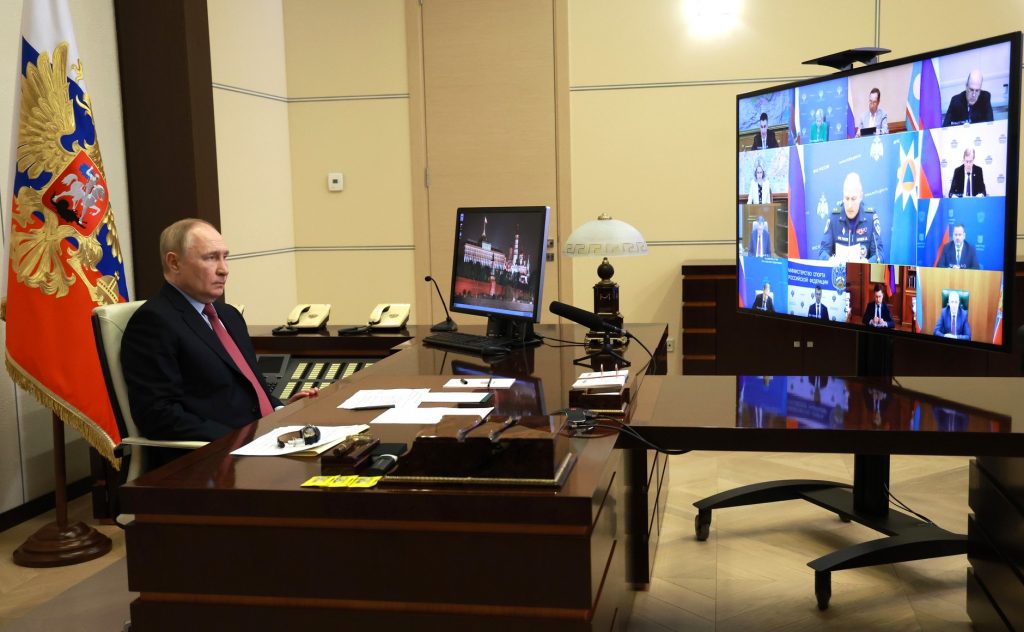
On Wednesday, 10 July, Vladimir Putin held a meeting with members of the Russian Government via video link. The main topic of discussion was the development of checkpoints at the state border. Reports were made by Deputy Prime Minister Vitaly Savelyev and Head of the Federal Customs Service Valery Pikalyov.
Vitaly Savelyev reported in detail on increasing the capacity of cross-border infrastructure, unified design and modernisation of checkpoints with the introduction of advanced registration and inspection technologies.
Also at the beginning of the meeting, the head of the Russian Emergencies Ministry, Alexander Kurenkov, briefed Putin on the situation with forest fires in the regions and the elimination of the consequences of spring floods. Head of the Ministry of Construction Irek Faizullin commented on the progress of construction and restoration of housing in flooded areas. Head of the Ministry of Natural Resources Alexander Kozlov reported separately on the monitoring of fire-prone areas and the relevant work of the “Aviaforestry”.
At the same time, Minister of Culture Olga Lyubimova spoke about the project “Big Tour”. It involves 268 theatres (almost half of all the theatres in the country), including those from new regions. Russian creative teams will also perform in 22 countries. In addition, 24 theatres from Kazakhstan, Kyrgyzstan, Belarus, Tajikistan, Azerbaijan, Uzbekistan, Abkhazia and South Ossetia will come to Russia.
Labour Minister Anton Kotyakov reported on the employment situation and the results of the All-Russian Employment Fair. Today Russia has a record low unemployment rate of 2.6 per cent and the number of employed people has increased to 74.1 million this year.
Sports Minister Mikhail Degtyaryov informed the meeting participants about the results of the BRICS Games in Kazan and a number of other competitions.
Results/Predictions:
Russia has already repeatedly raised the issue of excessively harsh filtration measures against citizens of Ukraine and other “unfriendly” states. In fact, only two checkpoints for those arriving from Ukraine are in operation. At the same time, there are excessively rigid forms of filtration based on criteria by which 2/3 of citizens cannot pass filtration. For example, even on the basis of the fact that people worked in Ukraine and paid taxes, which, of course, went to strengthen the defence capability. Now, after the change of the leadership of the 5th FSB Service, the Russian security services came to the government with a proposal to introduce new rules of border crossing. At the same time, measures for Central Asians may be tightened, as the threat of Wahhabism is now coming to the fore again.
4. Vladimir Putin’s speech at the 10th BRICS Parliamentary Forum
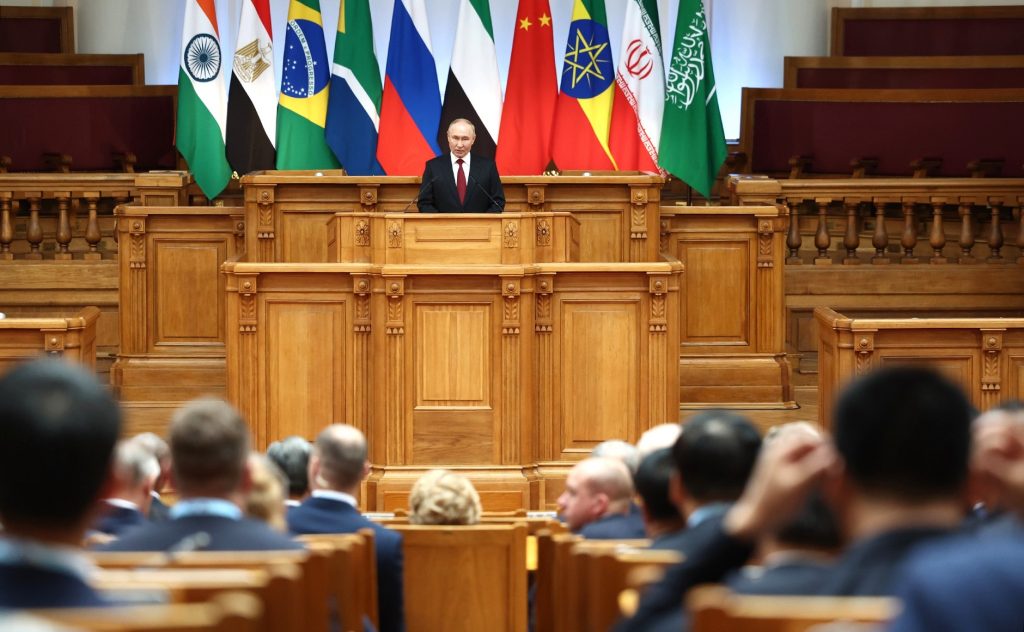
On Thursday, 11 July, Vladimir Putin took part in the plenary session of the X BRICS Parliamentary Forum, which was held at the Tauride Palace in St. Petersburg. The Russian President addressed the forum participants, voicing his vision of the prospects for strengthening inter-parliamentary cooperation.
Key theses from Putin’s speech:
- “The theme of this forum – ‘The Role of Parliaments in Strengthening Multilateralism for Equitable Global Development and Security’ – is extremely important. And it speaks for itself, emphasising the nature of the global, fundamental transformations that are taking place on our planet today.”
- “I repeat, today parliamentary dialogue, including within the BRICS framework, is more important than ever. After all, as representatives of the interests of your peoples, as spokesmen for their political and national will, you are keenly aware of the genuine demands, sentiments and needs of millions, it is no exaggeration to say billions of people on our planet.”
- “We are well aware that the establishment of a world order reflecting the real balance of power, the new geopolitical, economic and demographic reality is a complex and in many ways, unfortunately, even painful process. And above all because the efforts of the BRICS members and other developing countries face fierce resistance from the ruling elites of the states of the so-called golden billion”.
- “Acting contrary to historical logic and often even to the detriment of the long-term interests of their own peoples, they now seek to fix some kind of order on their so-called rules, which no one has seen, no one has discussed and no one has ever accepted. Such rules are written or adjusted anew every time – for every situation – in the interests of those who consider themselves exceptional and have arrogated to themselves the right to dictate their will to others. It is in the best traditions of classical colonialism. This is a clear attempt to replace legitimate international law, an attempt to create a monopoly on the truth in the last instance, and such a monopoly is destructive.”
- “There is growing pressure on everyone who has his own position. Contrary to the principles of international law, forceful coercion, unilateral sanctions, selective application of trade rules, blackmail are being used. We also see attempts to restrict direct contacts between legislators, which contradicts the principle of free inter-parliamentary co-operation and the sovereign right of official representatives of each State to defend its national interests. Therefore, the significance and demand for the collective work of people’s elected representatives on the creative agenda of our association is now multiplied”.
- “Since this year, the number of participants in our association has increased to ten. Each state is distinctive, carries ancient culture and traditions, implements its own model of socio-economic and political development. And Russia is making every effort to ensure that the new members of the association are effectively integrated into all its multidisciplinary mechanisms.”
- “One of the association’s priorities is to achieve positive changes in the global economy. We pay great attention to increasing the share of national currencies in trade and investment, as well as to developing safe and reliable financial instruments and mechanisms for mutual settlements. The establishment of humanitarian contacts also has a special role in establishing more trusting, strong and long-term relations between the states.”
- “Yes, BRICS does not yet have its own institutionalised parliamentary structure, but I believe that this idea will definitely be implemented in the future. And I am sure that your forum will contribute to this. The main thing is that such meetings have already proved to be an example of trust, mutual support and free dialogue, strengthening the authority of the organization itself and its influence in the world.”
Outcomes/Predictions:
A ritualised action that carried minimal meaning and no strategically important messages. Another call to “hold hands, friends, so that we do not disappear alone”. At the same time, Putin is using every opportunity in the context of preparations for the BRICS summit to demonstrate the increased polarisation of the world, as well as the lack of isolation by the representatives of the Global Yush at all possible levels.
5. Meeting with the permanent members of the Security Council
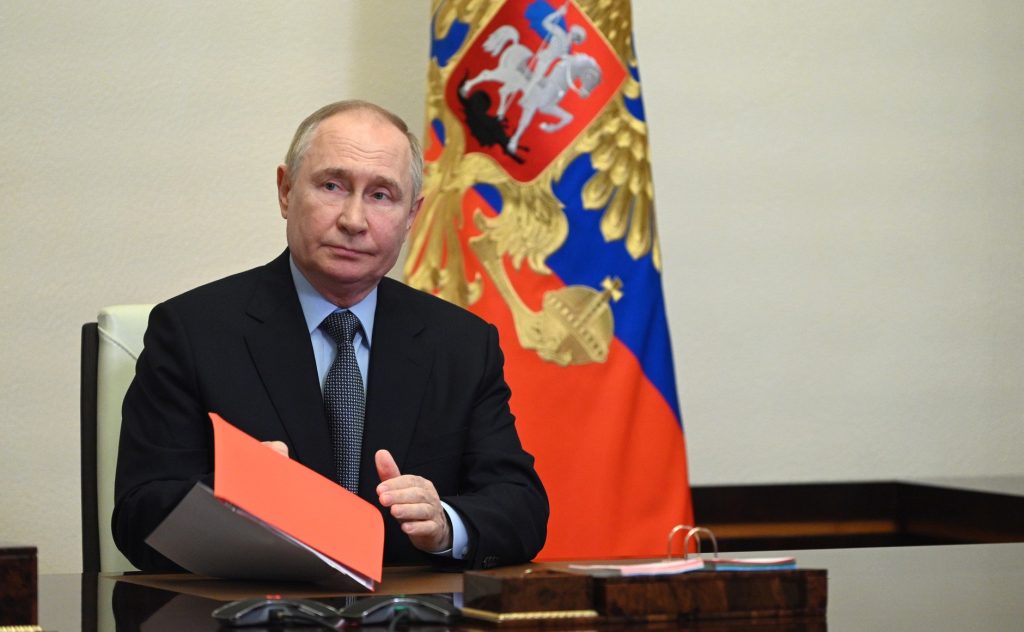
On Friday, 12 July, Vladimir Putin held an operational meeting with the permanent members of the Security Council of the Russian Federation via videoconference. According to official information, during the meeting they discussed additional measures to ensure the work of defence industry enterprises.
The meeting was attended by Prime Minister Mikhail Mishustin, State Duma Chairman Vyacheslav Volodin, Deputy Chairman of the Security Council Dmitry Medvedev, Head of the Presidential Administration Anton Vaino, Secretary of the Security Council Sergey Shoigu, Presidential Aide Nikolai Patrushev, Minister of Defence Andrey Belousov, Minister of Internal Affairs Vladimir Kolokoltsev, Director of the Federal Security Service Alexander Bortnikov, Director of the Foreign Intelligence Service Sergei Naryshkin, Special Presidential Representative for Environmental Protection, Ecology and Transport Sergei Ivanov, Prosecutor General Igor Krasnov, First Deputy Prime Minister Denis Manturov and Assistant to the President, Secretary of the State Council Alexei Dyumin.
Outcomes/Predictions:
According to Ascolta, the meeting focused solely on schedules for the release of military equipment, the launch of new weapons systems and the introduction of new developments. Putin demands that Chemezov and Manutrov show a very high rate of armament comparable to that of the US. He needs impressive figures as an argument for new negotiations with the West. Also, according to our information, Putin was not entirely satisfied with the figures that were voiced by Manturov.
6. Telephone conversation between Andrei Belousov and Lloyd Austin
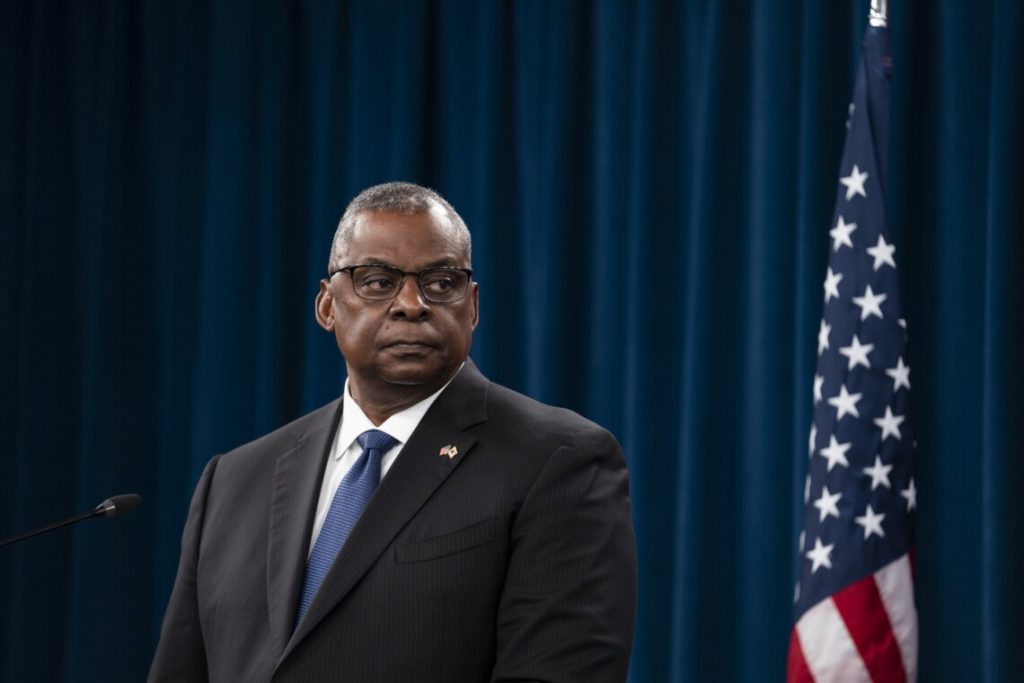
On Friday, July 12, a telephone conversation took place between the US and Russian Secretaries of Defence Lloyd Austin and Andrei Belousov. It is noteworthy that this conversation was the second in the last month. It is also noted that the conversation took place at the initiative of the Russian side.
According to the official statements of the parties, the main topic of the conversation was the discussion of the need to maintain communication channels between the countries, especially against the background of Russia’s ongoing war against Ukraine. At the same time, the Kremlin added that the issue of preventing security threats and reducing the risk of possible escalation was discussed.
Outcomes/Predictions:
In fact, the second conversation between the two defence ministers in the past month shows that the ever-present line of communication between the US and Russian defence departments is working again. The fact that immediately after the conversation the de-escalation of tensions on the Ukrainian-Belarusian border was announced is also telling – neither Lukashenko nor Zelensky would have made such a decision on their own. On the whole, it can be assumed that the parties have taken the first steps towards lowering the degree of relations between the two countries. But the real warming of relations is still a long way off.

